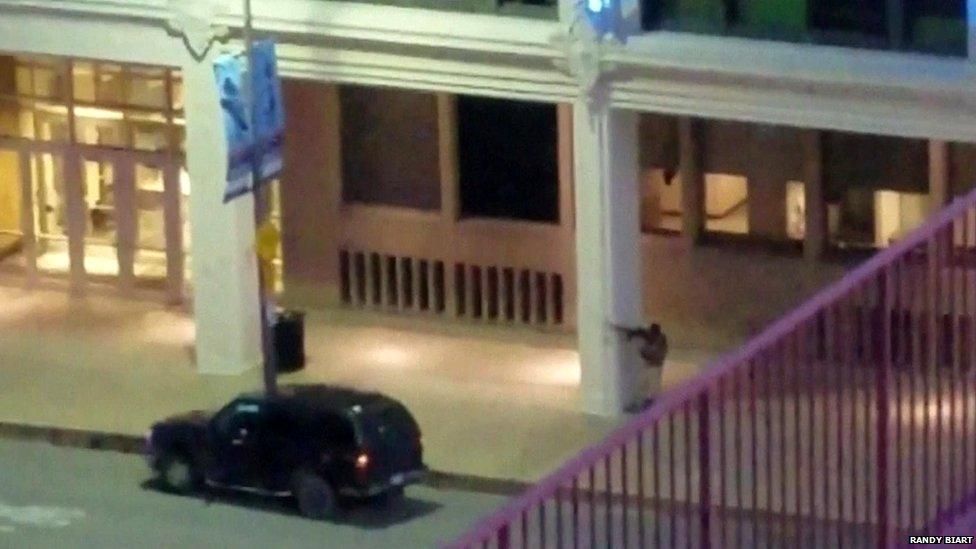Dallas shootings: Police touched by outpouring of support
- Published
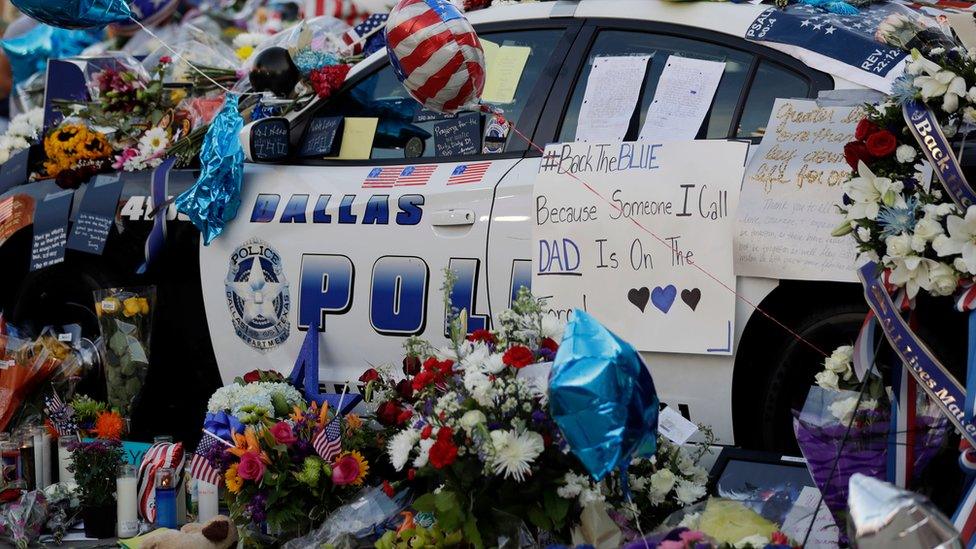
Dallas residents have expressed their support to the police after the shootings
For many people in Dallas this week, the police are heroes. And for the others - there's an uneasy truce.
Police officer Chris Gilliam, 52, is a big, burly man, a 29-year veteran of the police force, and he rides a motorcycle.
People don't usually give him flowers.
But on Friday a long-stemmed red rose was lying next to one of the motorcycle tyres. The motorcycle was blocking off a street in downtown Dallas near the place where his colleagues had been killed the night before.
Someone had left the rose there - part of an outpouring of support that Gilliam and other members of the police force received from the Dallas community on Friday.
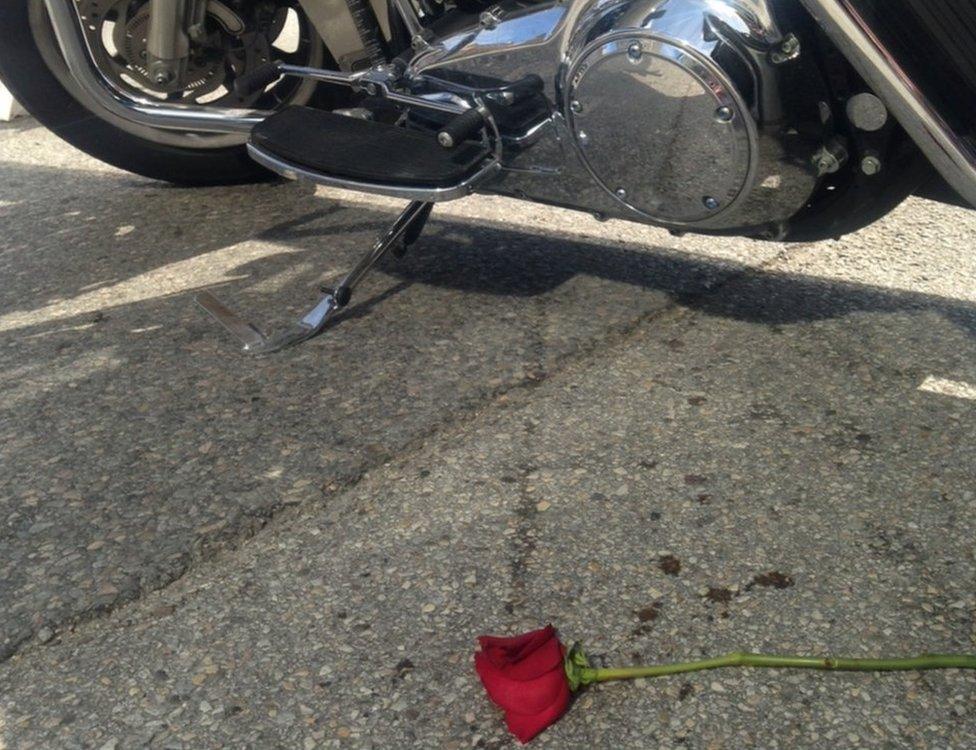
People were shocked and horrified by the way that officers were targeted and gunned down - and shared condolences, sympathy and bottled water, among other things, with the survivors.
On the night of the carnage, a 25-year-old sniper, Micah Johnson, had used an AR-15 rifle to shoot and kill five officers: Lorne Ahrens; Michael Krol; Michael Smith; Brent Thompson, a Dallas Area Rapid Transit officer; and Patrick Zamarripa.
Besides the dead, seven officers and two civilians were wounded in the attacks.
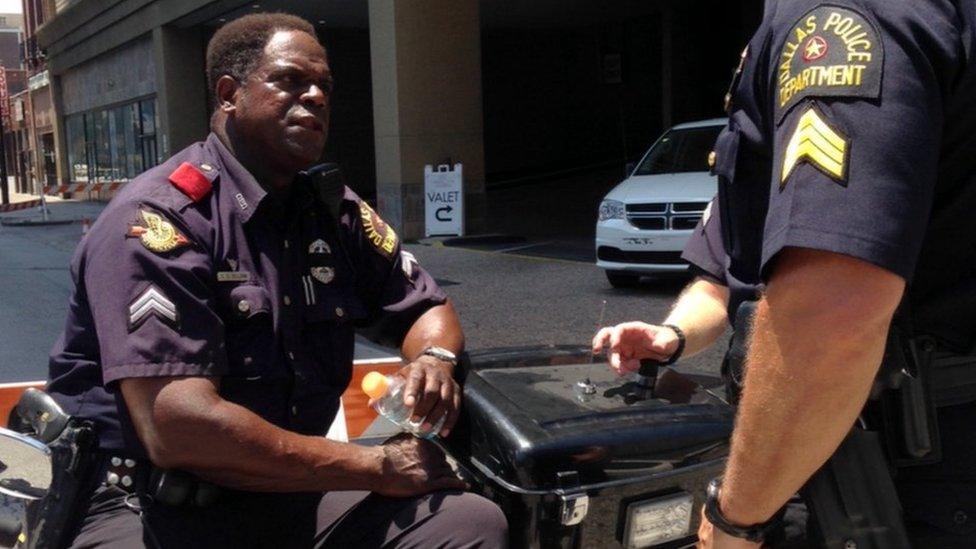
Chris Gilliam says his colleagues have felt the support from residents
The officers were shot during a protest by supporters of Black Lives Matter and others who had been campaigning against police violence.
Tension between black protesters and white police officers has flared up over the past two years, and people had taken to the streets of Dallas after black men were killed by police officers in Louisiana and Minnesota.
Johnson, a former army private, was enraged by the treatment of African-Americans at the hands of the police.
A step-by-step guide to Dallas shootings
After the attacks in central Dallas, police cornered him in a parking garage. He said he wanted to kill white officers, and he had stockpiled bomb-making equipment, ammunition and rifles at his house.
The police killed him with a robot and a bomb.
'We need your support'
The Dallas police chief, David Brown, spoke about the shootings of the police officers during a press conference on Friday morning.
He also talked about the way that police officers are seen by members of the community - and that the officers themselves sometimes feel unappreciated. He said he hoped that things would be different on that day and that people would recognise the sacrifices that officers make.
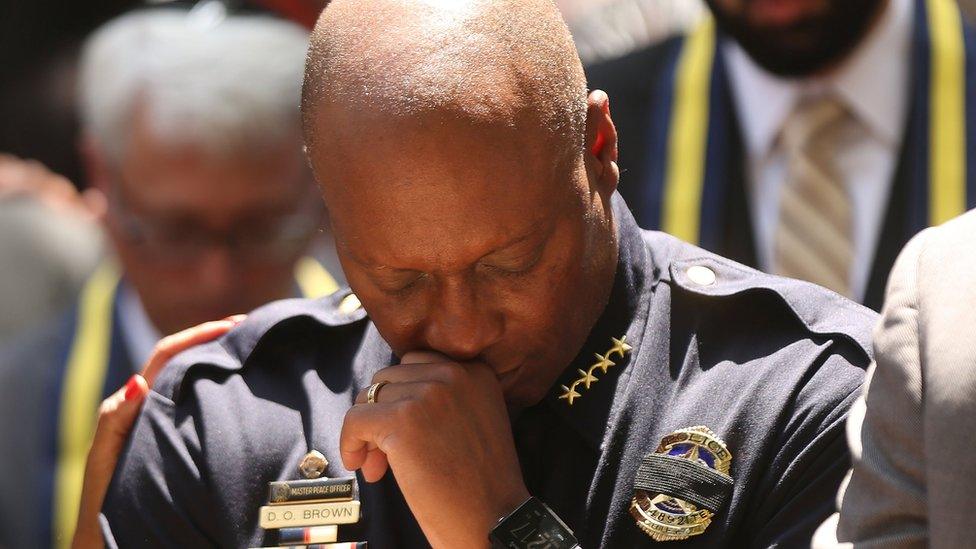
In the aftermath of the shooting, David Brown said: "We are heartbroken"
"We don't feel much support most days," he said. "Let's not make today most days. Please, we need your support to be able to protect you from men like these who carried out this tragic, tragic event."
The people who live in Dallas found it easy to follow his advice. In many US cities, police officers are feared and hated. But in Dallas things are a little different - the number of complaints against the police has fallen dramatically.
The force has plenty of detractors, including some of those who were marching against violence in the police force on the night of the assaults.
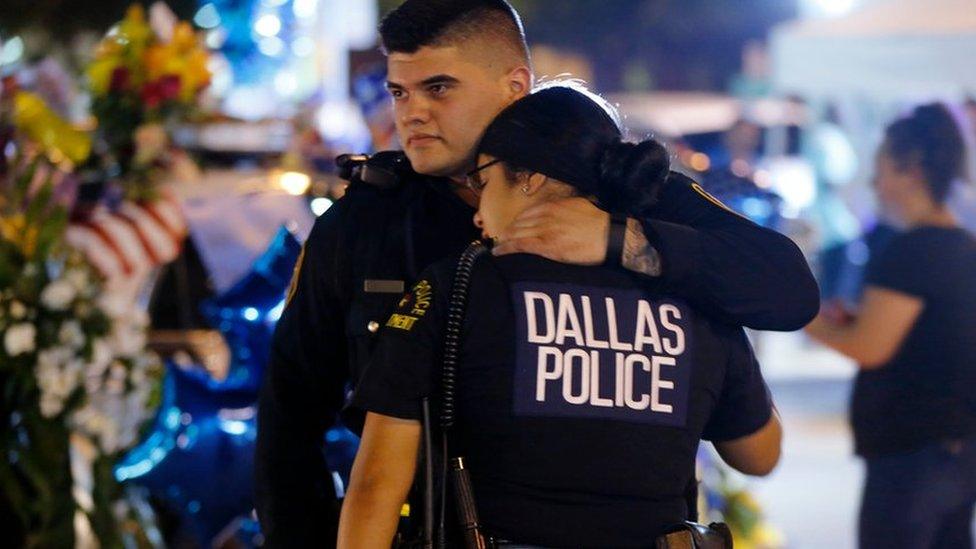
Police officers have complained of lack of support from Dallas community
But many people in this Texas city admire their officers, who are trained to bring down the possibility of violent encounters - "de-escalation", as mayor Mike Rawlings explained in a press conference on Friday.
He said that the police officers are drilled for these difficult situations. "We're one of the premier community policing cities in the country," he said. "This year we have the fewest police officer-related shootings than any large city in America."
Show of solidarity
The Dallas police force has maintained its record in part because the officers receive training in diversity and other aspects of community police work.
One police officer, Paul Kovach, who works in the southeast patrol division, said that the police department also runs outreach programmes so senior officers can spend time with students, teaching them about police work.
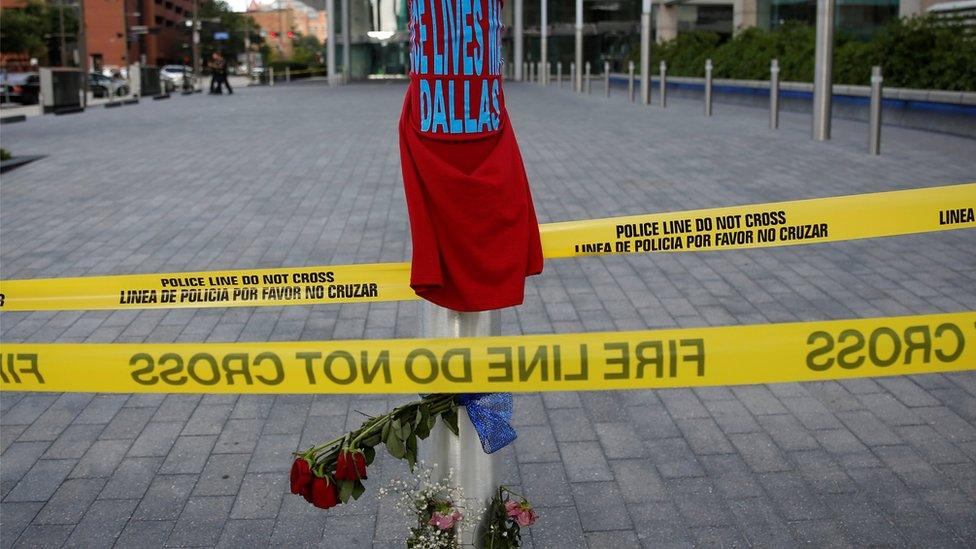
Tributes have been paid to officers killed
On Friday Kovach said that he saw "a big outpouring of appreciation" from people in the community. Standing on patrol at the airport, he watched travellers walk down the hallway and described what it was like to work with the community that morning.
"Just a lot of people thanking us," he said. "And praying for us."
Gilliam spent much of the day standing next to his motorcycle, blocking off a street in the downtown area where the shootings had occurred. The neighbourhood had been turned into a crime scene, with yellow police tape wrapped around trees and motorcycle barricades set up for the investigation.
Empty pizza boxes - lunch was a gift from strangers - were stacked near him at a traffic light, a light that blinked red and orange all day. It was hot on the corner, with a breeze that moved things around but didn't seem to cool anything.
A soldier dressed in camouflage walked up to Gilliam and offered him a bottle of Gatorade. Then the soldier glanced down and saw he'd just finished a sport drink. "Oh, you already got one," said the soldier, heading off to find an officer who was still thirsty.
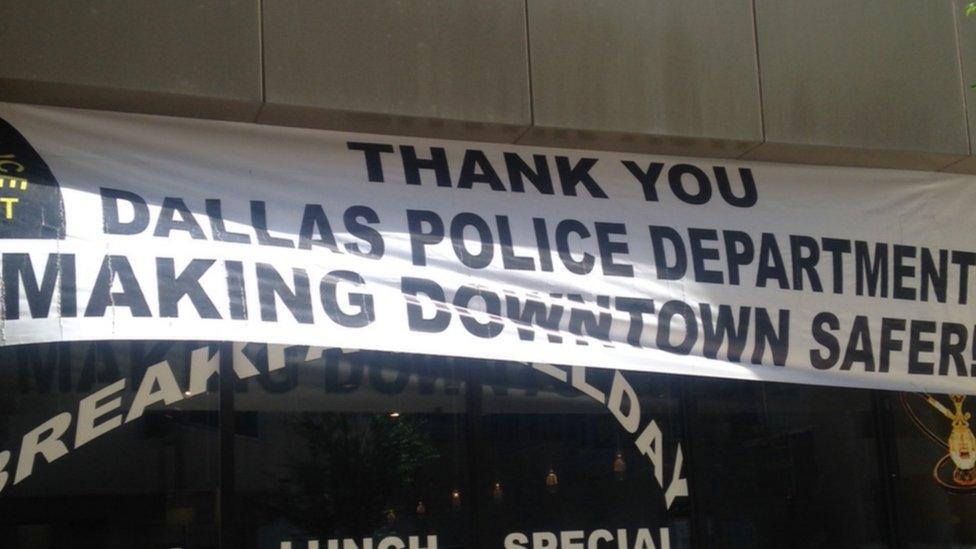
Nearby a memorial was made of soft toys, candles and flowers. People had hung a sign ("THANK YOU DALLAS POLICE DEPARTMENT") from a building.
One man, a military veteran, walked up to Gilliam and asked me to take a picture of them, standing together. "We feel the support," he told me.
Softer stance
The shootings of police officers made even the critics of the police force soften their language.
One of these critics, Greg Johnson, a stage technician, came into a convenience store in the neighbourhood with a colleague, Keelen Whitfield, during their lunch break.
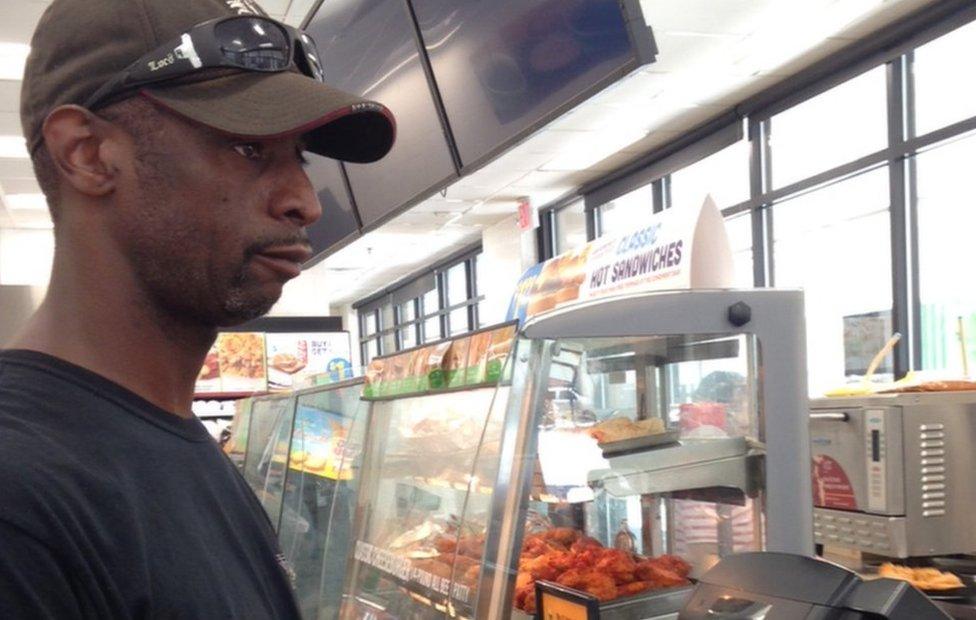
Greg Johnson says he is against the use of heavy weaponry by police officers
Johnson said he resented the way police officers carry heavy weaponry and artillery when dealing with the community. He said that they tote around the kind of weapons that are used in war zones.
"Why do you have to got so militarised?" he said, describing the police force.
Still he didn't condone the violence. "At the end of the day, those police officers - they're innocent," he said.
Standing next to his friend, Whitfield said he hoped that the shootings, however brutal, might change things - and that the other police officers would re-examine the way they act towards members of the community.
"The police may get the message to kind of tone it down on African Americans," he said.
What next?
In a park near the convenience store, Eric Adejuwon, 17, an activist with Black Lives Matter, was eating a microwaved cheeseburger near a spot where he'd marched the night before - and heard the shootings.
Wearing a Malcolm X T-shirt and a piece of ivory carved in the shape of Africa, Adejuwon said he was worried the police will retaliate against him and other activists, cracking down on their organisation. "There's a fear," he said.
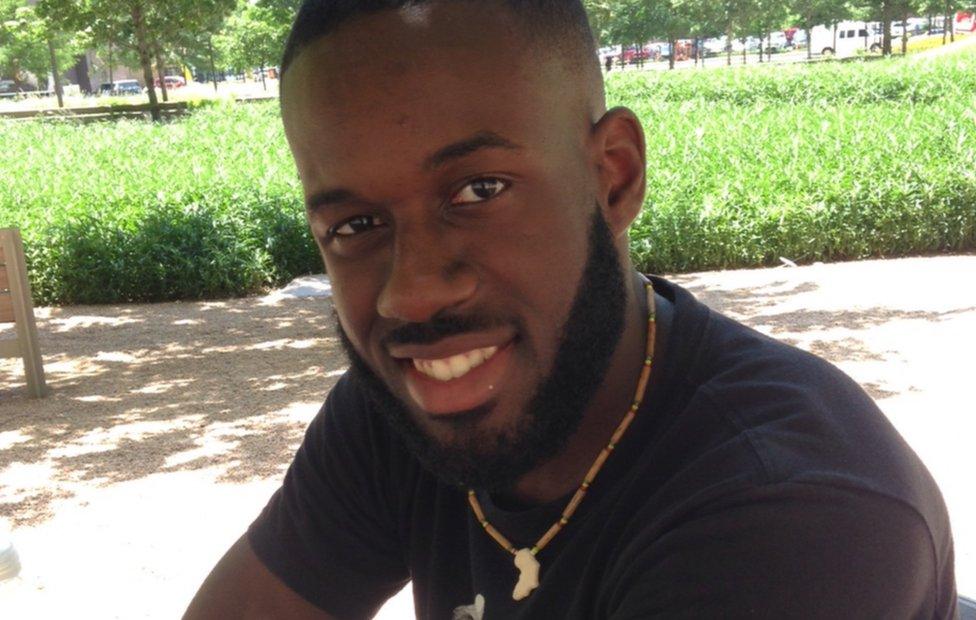
Eric Adejuwon sayd he fears a possible crackdown on the Black Lives Matter group
Yet this weekend, at least, the police officers and protesters appear to have reached a truce. For the activists, it is a time to reflect - and plan for the future.
For the officers, it is a period of grief. "It's been the worst day of my 29-year career," Gilliam told me. The thoughtful gestures, he said, were appreciated.
- Published8 July 2016
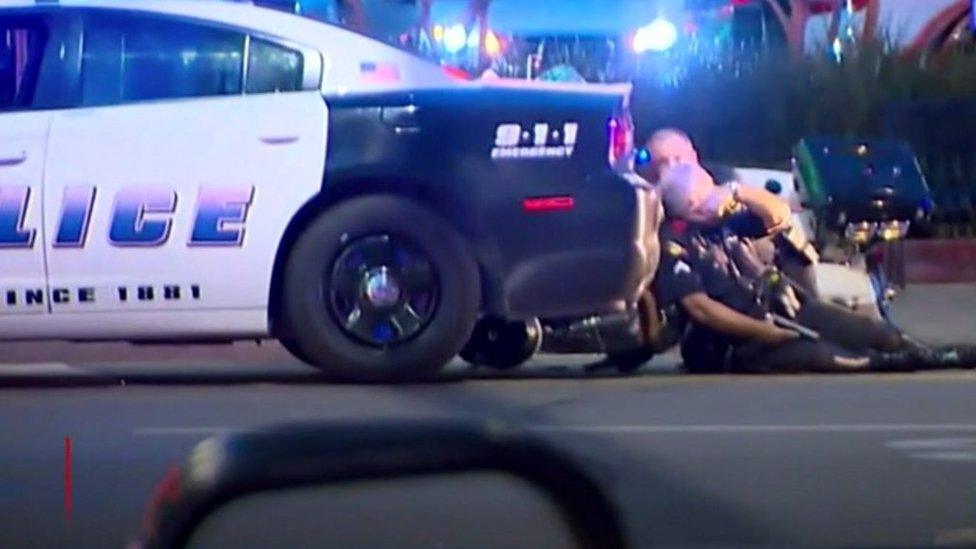
- Published9 July 2016
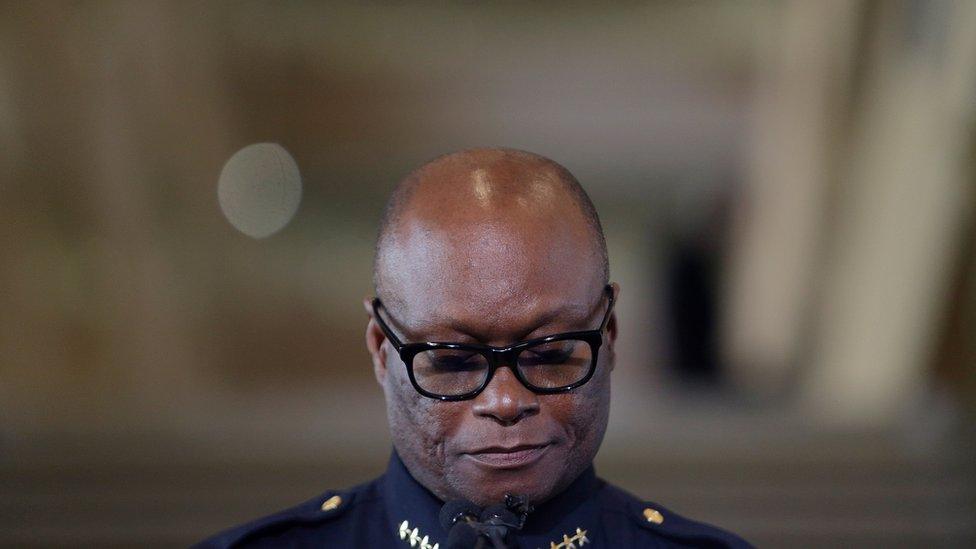
- Published9 July 2016
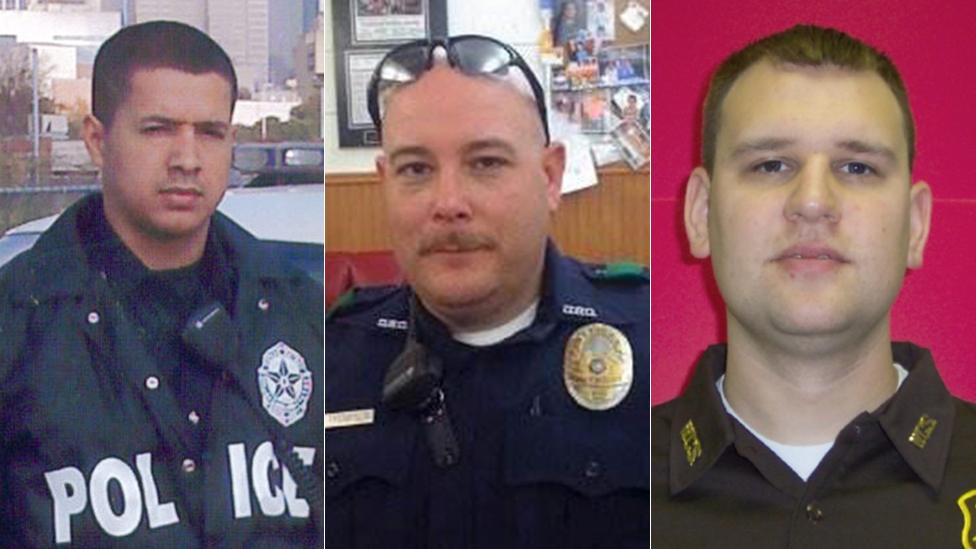
- Published8 July 2016
